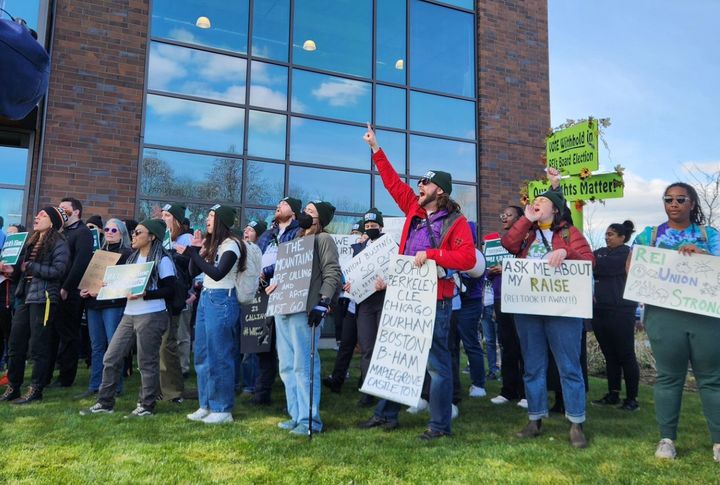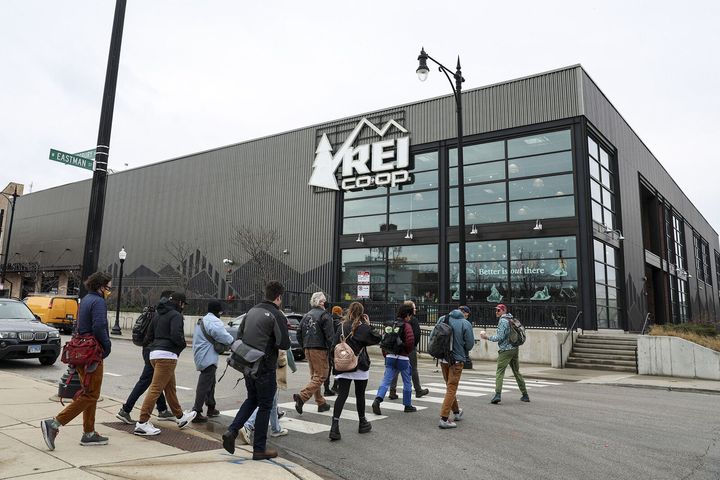A Growing Union Campaign Has Put REI’s Progressive Image On Trial
REI workers from stores around the country showed up uninvited at their corporate office in Issaquah, Washington, last Friday. The signs they were carrying made it clear to the white-collar employees looking down from the windows above that they weren’t there to tour the campus.
“Where the hell’s our merit pay?” one sign asked.
“Ask me about my raise (REI took it away!)” read another.
Plenty of REI’s devoted customers ― “members,” in company parlance, since REI is structured as a cooperative ― would have been surprised to see disaffected employees protesting such a beloved retailer. But a growing union campaign that has so far organized nine stores and counting is testing the progressive reputation that REI built through its environmental and conservation advocacy over the years.
Advertisement
Workers who are trying to improve their jobs through a union contract say the cooperative is failing to live up to its values and damaging its reputation in the process.
“I think they are trying to figure out how to be dug in on this and maintain their public image,” said Steve Buckley, a senior sales specialist and union leader at the company’s flagship store in the SoHo neighborhood of New York City. “That is getting increasingly harder to do as the days go on.”
Buckley’s was the first of REI’s 181 stores to unionize, in March 2022, joining the Retail, Wholesale and Department Store Union. The RWDSU and its parent group, the United Food and Commercial Workers Union, have organized eight more stores, with election wins in Berkeley, California; Cleveland; Chicago; Durham, North Carolina; Boston; Bellingham, Washington; Maple Grove, Minnesota; and Indianapolis.
“I think they are trying to figure out how to be dug in on this and maintain their public image.”
– Steve Buckley, REI worker in New York City
Advertisement
Employees at REI’s store in Santa Cruz, California, on Thursday became the latest to petition for an election, with a vote likely to happen in the coming weeks.
But none of those stores has secured a contract more than two years after the SoHo victory. In the meantime, the unions have accused REI of threatening pro-union workers, firing union supporters and bargaining in bad faith in an effort to slow the organizing campaign.
The company has denied those allegations and said it’s serious about reaching agreements with all the union shops.
“REI is — and will always be — committed and engaged in good-faith bargaining with stores that have chosen union representation,” the company said in a statement. It added that the firings in question “were completely unrelated to whether or not that employee was involved with the union ― individual employee union interest or activity is not a factor.”

Courtesy REI Union
Advertisement
The company made its stance against the union evident early on, when it released a podcast with its CEO, Eric Artz, and chief diversity and social impact officer, Wilma Wallace. People were quick to point out on social media that Artz and Wallace introduced themselves with a land acknowledgment — noting they were on land stolen from Indigenous people — as they tried to discourage collective bargaining by their employees.
REI views climate change as “an existential threat to life outside” and has set a goal to reduce its greenhouse gas emissions by 47% by 2030. It has also publicly committed to becoming a “fully inclusive, anti-racist, multicultural organization” and maintains a factory code of conduct for sourcing products based on standards set by the International Labour Organization. The code includes a stipulation on collective bargaining that requires suppliers to “recognize and respect the legal rights of employees to free association.”
The retailer maintains that it respects those rights here in the U.S., but workers at the union stores disagree ― and they’re increasingly sharing their views with the cooperative’s progressive customer base. The unions say they recently got more than 4,000 members to email REI telling the company to negotiate contracts.
“There’s a large gap between what REI tells the members and what REI is actually doing that we see as employees,” said Sihua Chang, 31, a sales specialist in the Durham store. “Way more REI members are starting to hear about our working conditions.”
Workers recently put out a list of bargaining demands labeled “10 essentials” for a sustainable REI, a riff on the 10 essentials needed to survive in the backcountry. The list includes “navigation” (predictable scheduling), “shelter” (minimum hours with a livable wage) and a “repair kit” (commitment to diversity).
Advertisement
“I thought they strive toward this progressive image, this idea that our workers are our lifeblood…. To see this campaign against workers has been a stark reality change.”
– Alaina Preddie, REI worker in Indiana
Lack of consistent hours is a common grievance among the union stores and across retail more generally. Anni Saludo, who also works at the Durham store, said she typically gets her schedule eight days in advance, making it hard to plan her life and impossible to know what her paycheck will look like.
“How can I stay on course if one week I’m scheduled 24 hours and six the next?” Saludo said. “How can I stay on course if I can’t schedule a medical appointment because I don’t know what days I’ll have off?”
The company and the union reached some tentative agreements in bargaining when REI was represented by the law firm Perkins Coie. But employees say progress slowed significantly after the company switched to Morgan Lewis, the same firm whose attorneys have argued on behalf of Trader Joe’s and Elon Musk’s SpaceX that the National Labor Relations Board itself is unconstitutional.
One of the most contentious issues is pay raises. After stores began unionizing, REI increased employee pay but withheld the hikes from organized stores, saying the raises needed to be negotiated at the bargaining table. The unions allege this was a retaliatory move meant to cool other locations on organizing.
Advertisement
REI eventually extended the raises but later took them back. The unions say it did so after workers refused to waive their right to strike as a precondition; REI says it was a temporary agreement that the union refused to extend.

Chicago Tribune via Getty Images
Alaina Preddie, who works at the Indianapolis store that unionized last month, said she’s been surprised by what she views as the company’s hardball tactics, as well as its hiring of a famously hard-nosed law firm.
“It’s been pretty shocking, actually,” Preddie said. “I thought they strive toward this progressive image, this idea that our workers are our lifeblood…. To see this campaign against workers has been a stark reality change.”
Along with Starbucks, Amazon, Apple and Trader Joe’s, REI is one of several previously non-union companies where unions have made organizing breakthroughs in the last two years. But parlaying those election wins into written agreements has proved much more difficult.
Advertisement
When they met at Issaquah last week, REI union members discussed different ways they could continue to pressure the company into settling contracts. They have already waged a number of temporary strikes and could expand them to more stores. And although the unions have not asked co-op members to boycott REI, Buckley said that thinking “may or may not change as workers see fit.”
They found some cause for optimism last month when Starbucks reached a detente with its union, pledging to hammer out a contract framework and extend raises and benefits that had been withheld from union stores. The coffee chain may have grown tired of bruising its own progressive image through a growing list of unfair labor practice charges, including claims of retaliatory firings, threats and store closures.
Buckley believes REI will start to squirm as more stores file election petitions and the union’s allegations of illegal union-busting are litigated. But he said the point of the campaign is not simply to “harangue” the company about hypocrisy. REI holds itself out as a different kind of company, he argued, so it should set a higher standard for retail work.
“It doesn’t need to be a short-term churn-and-burn retail establishment,” Buckley said. “What this movement is all about is holding REI to their own level of commitments.”
Advertisement

Comments are closed.